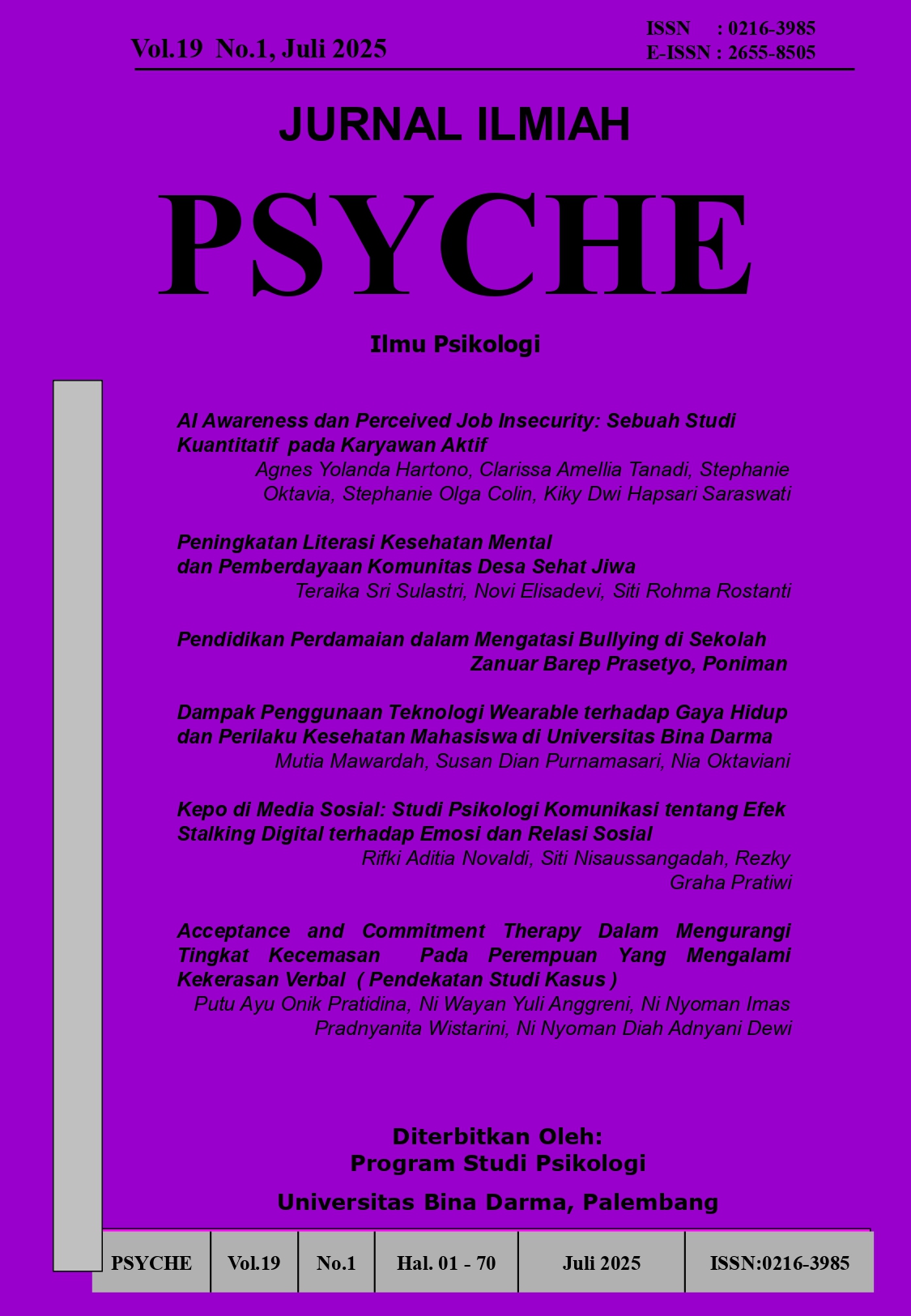Kepo di Media Sosial: Studi Psikologi Komunikasi tentang Efek Stalking Digital terhadap Emosi dan Relasi Sosial
DOI:
https://doi.org/10.33557/rjcppj74Keywords:
Digital Stalking, Communication Psychology, Parasocial RelationshipsAbstract
The development of social media has changed the way individuals form social relationships, but has also given rise to the phenomenon of digital stalking the unobtrusive observation of others' lives without direct interaction. This study aims to identify the forms, psychological motives, and impacts of digital stalking behavior in the context of one-way communication. Using a quantitative correlational approach, data were collected from 250 respondents aged 18–35 years through an online questionnaire. The results indicate that the primary motives for stalking behavior are curiosity, the need for connectedness, and self-validation. The intensity of digital stalking is significantly positively correlated with anxiety, envy, and overthinking, and negatively correlated with the quality of social relationships. These findings are supported by a regression model, which shows that psychological motives significantly influence stalking behavior (R² = 0.412). This study confirms that digital stalking is not simply a passive activity, but rather a form of emotionally charged symbolic communication with psychosocial impacts. The main contribution of this study lies in the integration of parasocial, uses and gratifications, and social comparison theories in understanding the dynamics of non-romantic interactions on social media. These results are relevant for the development of psychological interventions and digital literacy strategies.
References
Abrams, Karen M, & Robinson, Gail Erlick. (1998). Stalking Part I: An Overview of the Problem. The Canadian Journal of Psychiatry, 43(5), 473–476. https://doi.org/10.1177/070674379804300504
Acquadro Maran, D., & Varetto, A. (2017). Motives to Report Stalking Cases to the Police: A Comparison Between a Large City and a Small Town in Italy. Journal of Aggression, Maltreatment & Trauma, 26(5), 507–524. https://doi.org/10.1080/10926771.2016.1270380
Agha, F., & Kamran, F. (2024). Cyber-Stalking, Social Comparison, and Psychological Well-being in University Students. Applied Psychology Review. https://doi.org/10.32350/apr.31.01
ANDINI, F. (2022). Hubungan Antara tingkat Kesepian Dengan Parasocial relationship Pada remaja Penggemar K-Pop di Komunitas EXO-L lampung. UNIVERSITAS ISLAM NEGERI RADEN INTAN LAMPUNG.
Ardhana, V. Y. P., Sari, M. N., Kumoro, D. T., Hidayati, L., Prasetyo, Y. P. W., Liantoni, F., Mulyodiputro, M. D., Haryadi, D., & Setiawan, D. (2025). Strategi dan Teknologi Media Sosial. Mega Press Nusantara.
Brake, E. (2023). How Does Stalking Wrong the Victim? Ethics, 134(1), 4–31. https://doi.org/10.1086/725815
Chiu, C.-M., & Huang, H.-Y. (2015). Examining the antecedents of user gratification and its effects on individuals’ social network services usage: the moderating role of habit. European Journal of Information
Systems, 24(4), 411–430. https://doi.org/10.1057/ejis.2014.9
Howard, R. R., McCrory, C., Nilles, H., Sorg, K., Stougaard, J., & Slesar, G. (2012). The Art of Facebook Stalking.
Hucker, S. (2016). Forensic Psychiatry and Forensic Psychology: Stalking. 684–687. https://doi.org/10.1016/B978-0-12-800034-2.00194-4
Maulida, G., & Romdoni, M. (2024). Perlindungan hukum terhadap korban pelecehan seksual yang mengalami viktimisasi sekunder di media sosial. Southeast Asian Journal of Victimology, 2(1), 59–79.
Miller, L. (2012). Stalking: Patterns, motives, and intervention strategies. Aggression and Violent Behavior, 17(6), 495–506. https://doi.org/https://doi.org/10.1016/j.avb.2012.07.001
Morris, Matthew C, Bailey, Brooklynn, & Ruiz, Ernesto. (2019). Pain in the Acute Aftermath of Stalking: Associations With Posttraumatic Stress Symptoms, Depressive Symptoms, and Posttraumatic Cognitions. Violence Against Women, 26(11), 1343–1361. https://doi.org/10.1177/1077801219857829
Mullen, P. E., Pathé, M., & Purcell, R. (Ed.). (2000). Assessing and managing the stalker. In Stalkers and their Victims (hal. 279–288). Cambridge University Press. https://doi.org/DOI: 10.1017/CBO9781139106863.016
Poniman., Suryanadi., J., Ardianto., H., & Gautama, S. A. (2023). The Influence of Emotional Intelligence on the Professionalism of SMKN Teachers in Bandar Lampung City. Journal of Adaptive Education, 1(January), 21–28.
Poniman, Ramadhan, Sutawan, K., & Rapiadi. (2023). How is spiritual intelligence impact a professional teacher’s development? LIGHTHOUSE INTERNATIONAL CONFERENCE PROCEEDING, 1, 278–281.
Rozatkar, A. R., & Gupta, N. (2019). The Concept of “Stalking” and Its Relevance to the Existing Phenomena of Internet and Social Media. Indian Journal of Social Psychiatry, 35(1).
Ruggiero, T. E. (2000). Uses and Gratifications Theory in the 21st Century. Mass Communication and Society, 3(1), 3–37. https://doi.org/10.1207/S15327825MCS0301_02
Tang, H., Yee, C., Ho, J., & Chen, Y. (2024). INTERVENING ROLE OF TOURISTS’ ENGAGEMENT IN USER-GENERATED CONTENT ON THEIR PRO-ENVIRONMENTAL BEHAVIOURS: A PERSPECTIVE OF VIRTUAL GOFFMAN’S THEORY. GeoJournal of Tourism and Geosites. https://doi.org/10.30892/gtg.574spl15-1368
Tschan, W. (2005). Stalking: A treatment approach for offenders.
Wrede, S. J. S., Claassen, K., Rodil Dos Anjos, D., Kettschau, J. P., & Broding, H. C. (2023). Impact of digital stress on negative emotions and physical complaints in the home office: a follow up study. Health Psychology and Behavioral Medicine, 11(1), 2263068. https://doi.org/10.1080/21642850.2023.2263068
Downloads
Published
Issue
Section
License

Jurnal Ilmiah Psyche by http://journal.binadarma.ac.id/index.php/jurnalpsyche is licensed under a Creative Commons Attribution-ShareAlike 4.0 International License.









